|
|
|
Sort Order |
|
|
|
Items / Page
|
|
|
|
|
|
|
| Srl | Item |
| 1 |
ID:
093871
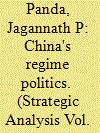

|
|
|
|
|
| Publication |
2010.
|
| Summary/Abstract |
Specialists on Chinese studies are divided on whether or not China is moving towards democracy. Many scholars forcefully argue that China by now is fairly democratic. While conforming to these views, this article prompts the thesis that China is already somewhat democratic today and is becoming more so. This is argued by highlighting the trends and the progressive character in its emerging regime politics. On the surface, these progressive trends and character may be seen as rhetorical and more as a communist proposition to legitimize its ruling. But the mere emergence of these democratic features confirms that the regime in China is in a phase of transition. In the idiom of political regimes, one may like to call it a 'hybrid' state
|
|
|
|
|
|
|
|
|
|
|
|
|
|
|
|
| 2 |
ID:
125100
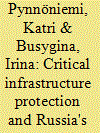

|
|
|
|
|
| Publication |
2013.
|
| Summary/Abstract |
The Russian policy on critical infrastructure protection was outlined in the early 2000s and has been consolidated in recent years as a part of the national security strategy. This policy is evolving against a background composed of an uneasy combination of factors: the degeneration of infrastructures critical for the country's economic and social development, and the de-legitimization of political institutions responsible for protecting 'population' and 'territory'. The recent major catastrophes in Russia, the notorious forest fires in 2010 in particular, have become examples of political events that offer a point of reference for the current regime's failure to uphold its promises of 'order and stability'.
|
|
|
|
|
|
|
|
|
|
|
|
|
|
|
|
| 3 |
ID:
193627


|
|
|
|
|
| Summary/Abstract |
Malaysia’s 15th general election in November 2022 decisively ended the country’s dominant-party system. What might take its place, however, remains hazy—how competitive, how polarized, how politically liberal, and how stable an order might emerge will take some time to become clear. The opposition Pakatan Harapan (Alliance of Hope), having secured a plurality of seats, but with a sharply pronounced ethnic skew, formed a coalition government with the previously dominant, incumbent Barisan Nasional (National Front) and smaller, regional coalitions. This settlement resolved an immediate impasse, but relied upon obfuscation of real programmatic, ideological, and identity differences, raising questions of longer-term durability or results. Examining this uncertainty, we broach three broad queries, with resonance well beyond Malaysia. First, we examine the fragmentation and reconsolidation of Malaysian party politics to explore how party dominance transforms or collapses. Second, we explore the extent to which its dominant party defined or confirmed Malaysia as electoral-authoritarian, and whether we should still consider it so. Third, we ask what possibilities Malaysia’s apparent party-system deinstitutionalization opens up for structural reform beyond parties. Does the deterioration of that system—more than simply the previous dominant party’s electoral loss—clear the way for more far-reaching liberalization? All told, we find that Malaysia’s incremental dismantling of its dominant-party system does not also spell the end of electoral authoritarianism. Party and party-system deinstitutionalization leave the system in flux, but illiberal reconsolidation is as plausible as progressive structural reform.
|
|
|
|
|
|
|
|
|
|
|
|
|
|
|
|
| 4 |
ID:
093618
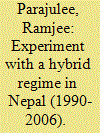

|
|
|
| 5 |
ID:
162094
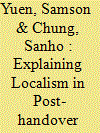

|
|
|
|
|
| Summary/Abstract |
The pro-democracy movement in post-handover Hong Kong had long been an intense struggle between the hybrid regime and prodemocracy civil society. Since the early 2010s, a new political force, broadly known as the localists, has entered the political domain through a series of protest events and elections. However, just as they gained a foothold in politics, the hybrid regime swiftly moved in to clamp down on the nascent movement to keep them out of the political system. What explains the ebbs and flows of Hong Kong’s localist movement? This essay posits that localism is not an inevitable product of the macro-structural socio-political process, but an amalgam of ideas and action logics assembled sequentially through events and discursive constructions. We argue that localism first emerged through the interplay between antimainlandisation protests and both online and intellectual discourse, and officially ascended to the political stage after the Umbrella Movement. Despite their meteoric rise, localists’ militant actions have allowed the hybrid regime to marginalise the nascent force through legal and non-legal repression, which has in turn created a “divided structure of contestation” among the opposition.
|
|
|
|
|
|
|
|
|
|
|
|
|
|
|
|
| 6 |
ID:
193022


|
|
|
|
|
| Summary/Abstract |
The president of Tunisia, Kais Saied, recurred to Article 80 of the constitution on 25 July 2021 to proclaim the “state of exception,” freezing parliamentary activities, removing the representatives’ immunity, and dissolving the government headed by Prime Minister Hichem Mechichi. The following presidential decree 2021-117 on 22 September granted him legislative powers by decree, dismantling the constitution of 2014, which was the cornerstone of the result of the “Jasmine Revolution” of 2011. This article will analyze the constitutionality of the presidential decrees and shed light on the juridical, socioeconomical, and political circumstances that allowed Saied to perform what can be described as a constitutional coup or a self-coup, which reshaped the future of Tunisia.
|
|
|
|
|
|
|
|
|
|
|
|
|
|
|
|
| 7 |
ID:
165501
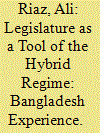

|
|
|
| 8 |
ID:
185374
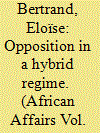

|
|
|
|
|
| Summary/Abstract |
Despite growing interest in party politics in Africa, the activities and roles of African opposition parties are still underexplored, especially in the context of one-party-dominant ‘hybrid’ regimes where they are allowed to operate but face a myriad of constraints. In these settings, opposition parties face a common dilemma: having to participate in the regime’s institutions and protest against them at the same time. Existing frameworks fail to provide a full and accurate picture of how opposition parties can erode the incumbent’s dominance and promote regime change. This article offers a novel functional framework, drawing from comparative research in Burkina Faso and Uganda. It identifies a set of three functions that opposition parties perform within a hybrid regime: denunciation, mobilization of dissent, and succession signalling. Understanding opposition parties’ functions in a hybrid regime through this alternative framework enables us to reconcile the seemingly contradictory behaviour of opposition parties that work both within and against the status quo and to better evaluate their role in this setting.
|
|
|
|
|
|
|
|
|
|
|
|
|
|
|
|
| 9 |
ID:
153689
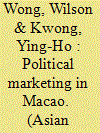

|
|
|
|
|
| Summary/Abstract |
To what extent can political marketing narrow the legitimacy gap for a hybrid regime? This article examines this question through the case of Macao (2009–14). It finds that political marketing is insufficient to compensate for lack of democratic reform and may easily backfire to expose the problem of a structural legitimacy deficit.
|
|
|
|
|
|
|
|
|
|
|
|
|
|
|
|
| 10 |
ID:
146514
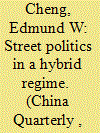

|
|
|
|
|
| Summary/Abstract |
This paper examines the diffusion of activism in post-colonial Hong Kong through the lens of the political regime and eventful analysis. It first reveals the institutional foundations of the hybrid regime that allowed the creation of a nascent movement society. It then explains how the historic 1 July rally in 2003 and a series of critical events since 2006 have led to a shift in scale and the public staging of street politics. A time-series analysis and onsite survey further capture the dynamics that spawned the collective recognition of grievances and reduced participation costs, leading to the Umbrella Movement. While the spontaneous, voluntary and decentralized organizational structure sustained protest momentum, the regime has adopted hybrid strategies to counter-mobilize bottom-up activism. The result is widening contention between the state and civil society and within civil society, or the coexistence of regime instability and regime longevity, a trend that is increasingly common in hybrid regimes encountering mass protests.
|
|
|
|
|
|
|
|
|
|
|
|
|
|
|
|
| 11 |
ID:
160305
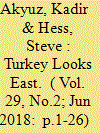

|
|
|
|
|
| Summary/Abstract |
This essay examines the impact of Turkey's growing international links to China, Russia, and other non-Western powers on democratic backsliding by the administration of Recep Tayyip Erdogan. The essay finds that China's and Russia's growing engagement with Turkey since the middle of the first decade of the 2000s, coupled with Turkey's stalled bid for European Union membership, played an important role in deleveraging Western democratizing influence on Turkey. This shift in the international balance opened a window of opportunity for the Erdogan administration to engage in backsliding activities and proved to be a more significant driver for backsliding than other common predictors.
|
|
|
|
|
|
|
|
|
|
|
|
|
|
|
|
| 12 |
ID:
156632
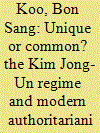

|
|
|
|
|
|
|
|